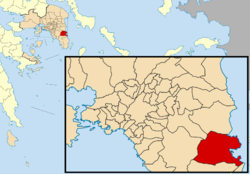Markopoulo Mesogaias
Markopoulo Mesogaias
Μαρκόπουλο Μεσογαίας | |
|---|---|
| Coordinates: 37°53′N 23°56′E / 37.883°N 23.933°E | |
| Country | Greece |
| Administrative region | Attica |
| Regional unit | East Attica |
| Government | |
| • Mayor | Kostas Allagiannis[1] (since 2019) |
| Area | |
• Municipality | 81.84 km2 (31.60 sq mi) |
| Elevation | 80 m (260 ft) |
| Population (2021)[2] | |
• Municipality | 21,722 |
| • Density | 270/km2 (690/sq mi) |
| Time zone | UTC+2 (EET) |
| • Summer (DST) | UTC+3 (EEST) |
| Postal code | 190 03 |
| Area code(s) | 22990 |
| Vehicle registration | Z |
| Website | www.markopoulo.gr |
Markopoulo Mesogaias (Greek: Μαρκόπουλο Μεσογαίας) is a town and a municipality in East Attica, Greece. The municipality has an area of 81.844 km2 (31.600 sq mi).[3]
Geography
[edit]The municipality Markopoulo Mesogaias is situated in the Mesogaia plain, in the eastern part of the Attica peninsula, and touches the Aegean Sea coast in the east, where the port town Porto Rafti is located. The town Markopoulo is in the western part of the municipality, at about 80 m (260 ft) elevation. It is 5 km (3.1 mi) north of Kalyvia Thorikou, 6 km (3.7 mi) east of Koropi and 21 km (13 mi) southeast of Athens city centre. Greek National Road 89 (Gerakas - Koropi - Lavrio - Sounio) passes through Markopoulo. Athens International Airport is 4 km (2.5 mi) north of the town. Markopoulo had a railway station on the Athens–Lavrion Railway, which closed for passenger traffic in 1957.
Settlements
[edit]- Agía Triáda (2021 census pop. 285)
- Vravróna, ancient Brauron (pop. 268) - located in the northeast by the Aegean Sea
- Chamoliá (pop. 134)
- Koulidás (pop. 115)
- Markópoulo (pop. 10,394) - the municipal seat
- Poriá (pop. 0)
- Porto Rafti or Limín Markopoúlou (pop. 10,526)
History
[edit]Markopoulo along with Malakasa, Kakosalesi and Spata is one of the earliest villages formed by Albanian settlers in medieval Attica and it had already appeared by 1456.[4] As such, Markopoulo has historically been an Arvanite settlement.[5]
Historical monuments
[edit]- The church of Saint Paraskevi, in 1741 (Markopoulo-Mesogeia). A wall painting monument (1741) of George Markou the Argus, the great and prolific post-Byzantine ecclesiastic iconographer of the 18th century ("....La Santa Parascevi (inizio della sua agiografia1741׃ ,(che si trova al paesimo di Marcopulo, dell 'Attica...." Evangelos Andreou http://ketlib.lib.unipi.gr/xmlui/handle/ket/849)[6]
- The church of Saint Thecla. A wall painting monument (18th century) of "Georgios Markou the Argeius" iconographers school http://www.biblionet.gr/book/178713/Ανδρέου,_Ευάγγελος/Γεώργιος_Μάρκου_ο_Αργείος
- The Temple of Artemis in Brauron
Sports
[edit]Markopoulo was the home to two venues of the 2004 Summer Olympics: the Markopoulo Olympic Equestrian Centre and the Markopoulo Olympic Shooting Centre.
Markopoulo's women volleyball team plays in the A1 Ethniki Women's Volleyball, the highest level national competition.
| Sport clubs based in Markopoulo | |||
|---|---|---|---|
| Club | Founded | Sports | Achievements |
| Marko F.C. | 1927 | Football | Earlier presence in Gamma Ethniki |
| Markopoulo Athletic Club - AOM | 1988 | Volleyball | Presence in A1 Ethniki women volleyball |
Economy
[edit]Historically, the economy of the region has been largely agricultural, with grapes and wine being the major components of the local economy until today. The Merenda quarry also allowed for a major economic expansion during the 1990s, however operations have ceased since 2014. Today, tourism is a major driver as the nearby seaside town, Porto Rafti, is a very popular tourist destination in Attica.
Multiple companies, including SkyGreece Airlines have had their corporate headquarters in Markopoulo Mesogaias due to the easy access to Athens International Airport.
Historical population
[edit]| Year | Population |
|---|---|
| 1981 | 9,388 |
| 1991 | 14,499 |
| 2001 | 15,608 |
| 2011 | 20,040 |
| 2021 | 21,722 |
See also
[edit]References
[edit]- ^ Municipality of Markopoulo Messogheas, Municipal elections – October 2023, Ministry of Interior
- ^ "Αποτελέσματα Απογραφής Πληθυσμού - Κατοικιών 2021, Μόνιμος Πληθυσμός κατά οικισμό" [Results of the 2021 Population - Housing Census, Permanent population by settlement] (in Greek). Hellenic Statistical Authority. 29 March 2024.
- ^ "Population & housing census 2001 (incl. area and average elevation)" (PDF) (in Greek). National Statistical Service of Greece. Archived from the original (PDF) on 2015-09-21.
- ^ Karidis, Dimitris (2014). Athens from 1456 to 1920: The Town under Ottoman Rule and the 19th-Century Capital City. Archaeopress. p. 34. ISBN 1784910724.
Therefore a few years before the Ottomans captured Athens (1456) several Albanian villages had already spread across Attica (villages such as Kakosalesi, Markopoulo, Malakasa fall under this category).
- ^ Hans-Jürgen Sasse (1991). Arvanitika: die albanischen Sprachreste in Griechenland. Vol. 1. p. 18. ISBN 9783447027588.
- ^ ".:BiblioNet : Γεώργιος Μάρκου ο Αργείος / Ανδρέου, Ευάγγελος". www.biblionet.gr. Retrieved 2018-11-16.
External links
[edit]



